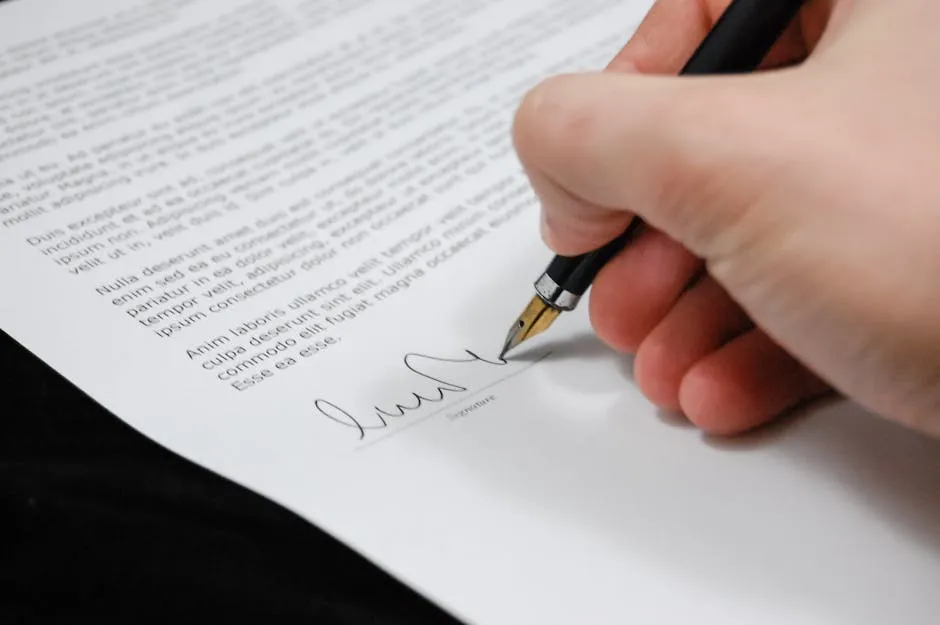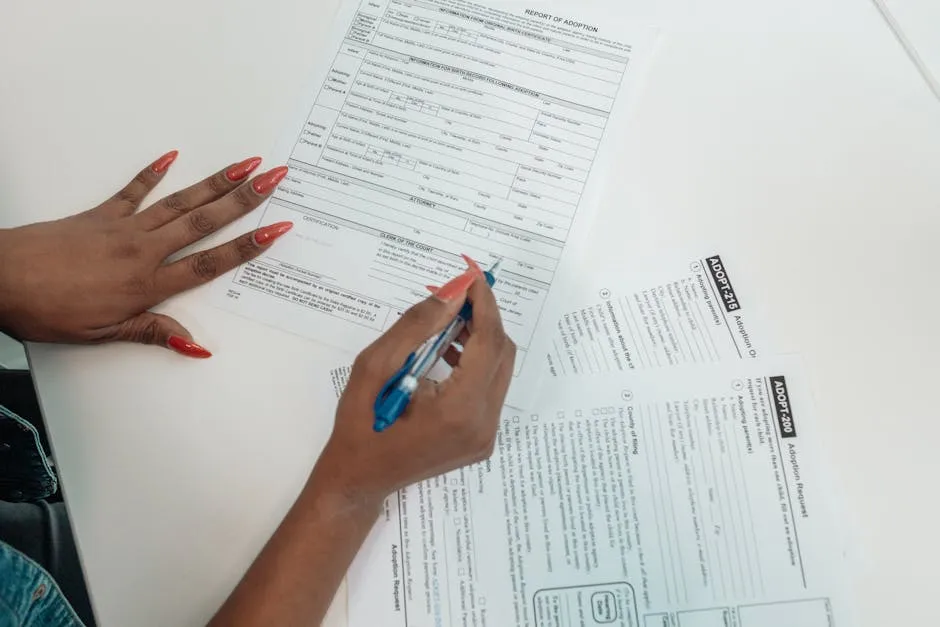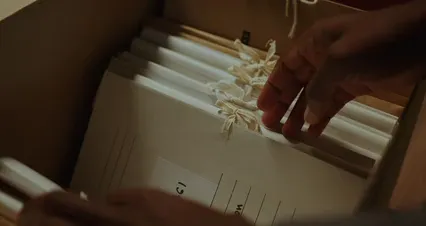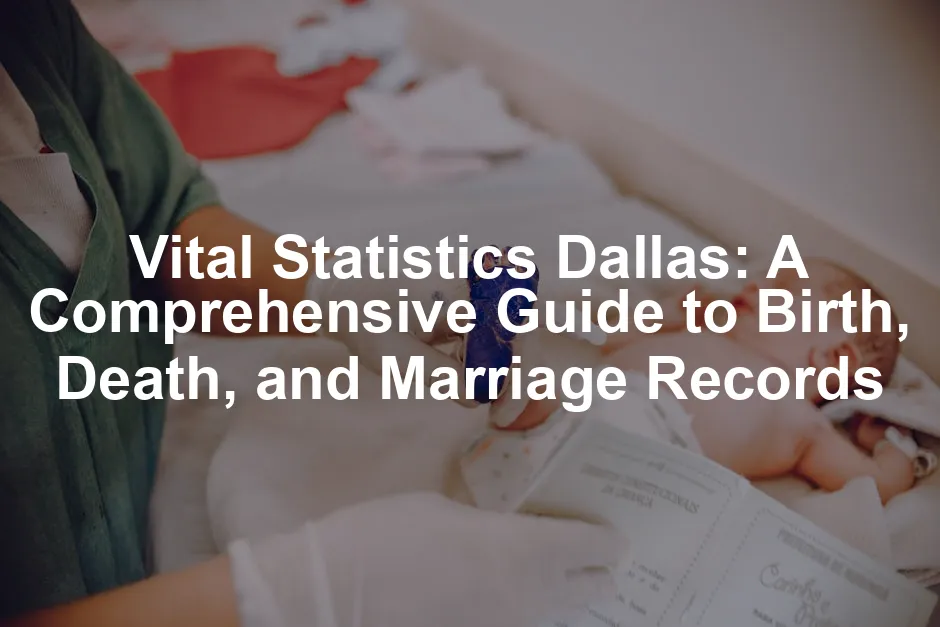Introduction
Vital statistics are essential records that document significant life events. These events include births, deaths, marriages, and divorces. They play a crucial role in personal and legal contexts. Need to prove your identity for a passport? Or perhaps you want to claim insurance after a loved one’s passing? Vital records are your best friends in these scenarios.
Dallas is a bustling hub for obtaining these vital records. It’s not just a city; it’s a place where data meets life’s pivotal moments. Residents can access the Bureau of Vital Statistics to obtain the needed documentation without too much hassle.
Recently, the Bureau of Vital Statistics relocated to the J. Erik Jonsson Central Library. This new location is a game-changer! Now, residents can enjoy library resources while managing their vital record needs. Need to print identification or fill out forms? The library has you covered!
And speaking of keeping your documents organized, a reliable Document Shredder can help you safely dispose of sensitive information. It’s the perfect companion for decluttering while ensuring your personal data remains secure. Nobody wants their identity stolen, right?
Understanding the types of records available is vital. Each record serves a specific purpose, and knowing how to access them can save time and frustration. The application process isn’t overly complicated, but it comes with its own set of requirements. There are restrictions too, especially regarding who can request certain records.
In this guide, we’ll walk you through the ins and outs of vital statistics in Dallas. You’ll learn what records exist, how to apply for them, and any potential roadblocks you might encounter. So, buckle up! We’re about to embark on an informative journey through the realm of vital records in Dallas.

Understanding Vital Statistics
What are Vital Statistics?
Vital statistics are records that capture significant life events. These documents are crucial for public health and administration. They serve as official proof of important occurrences in individuals’ lives. Without them, navigating legal and personal matters becomes tricky.
There are four primary types of vital records: birth certificates, death certificates, marriage licenses, and divorce decrees. Each record holds specific information relevant to the event it documents.
Birth certificates are issued at the time of birth and include personal details like the baby’s name, date, and place of birth. They’re often required for school enrollment, applying for government IDs, or getting a passport.
Death certificates confirm the passing of an individual. They contain details like the date, place, and cause of death. These documents are essential for settling estates and claiming life insurance benefits.
Marriage licenses document the union between two individuals. They are necessary for legal recognition of the relationship and can be required for various legal purposes.
Divorce decrees finalize the dissolution of a marriage. They are crucial for matters such as custody arrangements and property division.
Understanding these records and their significance can help individuals navigate life’s challenges more effectively. They are not just pieces of paper; they are the keys to unlocking various opportunities and fulfilling legal obligations.

Importance of Vital Records
Vital records are the unsung heroes of legal documentation in the United States. Think of them as your official life story, written in ink. They include birth certificates, death certificates, marriage licenses, and divorce decrees. These records are not just formalities; they hold substantial legal weight.
Imagine applying for a passport. You’ll need proof of your identity, and guess what? A birth certificate is usually the first item on the list. Or consider a legal proceeding where establishing your identity matters. Vital records serve as irrefutable evidence, ensuring you’re recognized in the eyes of the law.
Let’s not forget inheritance matters! If you’re claiming a loved one’s estate, you’ll need a death certificate. These records help clarify relationships and rights during such sensitive times. Without vital records, navigating these situations could feel like trying to find a needle in a haystack—time-consuming and frustrating.
To keep all these important documents safe, consider investing in a Document Safe. It’s like a fortress for your vital records! With a secure place to store them, you can rest easy knowing they’re protected from prying eyes and potential disasters.

Types of Vital Records Available in Dallas
Birth Certificates
Long Form vs Short Form
In Dallas, you can request two types of birth certificates: long form and short form. The long-form birth certificate is your go-to for official matters. It looks like the original document and includes comprehensive information, such as a history of corrections. This version is typically required when applying for a passport or other legal documents.
On the other hand, the short-form birth certificate, also known as an abstract, is a summary. It contains essential details like the name, date, and place of birth but lacks the depth of the long form. While the short form is acceptable for many purposes—like school registrations—it may not suffice for legal proceedings.
Eligibility for obtaining each type varies. For the long form, you can only request it for births that occurred within the city limits of Dallas from April 1983 to present. The fee for either version is $23, which is a small price to pay for such an important document.

How to Apply for Birth Certificates
Applying for a birth certificate in Dallas is as easy as pie! Here’s a step-by-step guide to help you navigate the process.
- Determine Your Method: You can apply in person, online, or by mail. Each method has its perks, but in-person applications often result in quicker processing.
- Gather Your Documents: You’ll need valid identification. Acceptable forms include a driver’s license, passport, or military ID. Also, prepare any additional documents that may be necessary, such as proof of relationship if you’re not the certificate holder.
- Fill Out the Application: Whether you’re applying online or in person, complete the application form accurately. Double-check for any errors to avoid delays.
- Submit Your Application:
- In Person: Head over to the J. Erik Jonsson Central Library, where the Bureau of Vital Statistics is located. Make sure to visit during their operating hours, which are 8:30 AM to 4:30 PM, Monday through Friday.
- Online: Use the VitalChek service, which allows you to apply securely from the comfort of your home. Just remember, there’s a small service fee on top of the standard charge.
- By Mail: Download the application form, fill it out, and send it along with your payment to the Dallas Bureau of Vital Statistics.
- Payment: The fee for a birth certificate is $23. Payment methods vary by application method, so check what’s accepted.
- Wait for Processing: Processing times can differ. If you apply in person, you might walk away with your certificate the same day, especially for births from 1983 onward. Mail requests may take longer, so plan accordingly.
With this guide, you’re all set to secure a birth certificate in Dallas. Easy peasy, right? Just remember, the sooner you start, the sooner you can tackle whatever life throws your way.

Death Certificates
Availability and Restrictions
In Dallas, obtaining a death certificate is a straightforward process. However, there are specific eligibility requirements. Generally, immediate family members, legal representatives, or individuals who can demonstrate a tangible interest can request these records.
The fees for a death certificate are set at $23 for the first copy. If you need additional copies, those will also cost $23 each. It’s worth noting that death certificates are available for individuals who passed away within the city limits of Dallas since April 1983. If you’re looking for records prior to that date, you may need to contact the Dallas County Clerk.
Records are typically processed quickly, but it’s advisable to allow extra time during peak periods. Make sure you have all necessary documentation ready to avoid any delays.
To keep track of all these important records, consider using a File Organizer. It can help you categorize and access your vital records easily, making your life a whole lot simpler. After all, who wants to dig through a messy pile of documents when time is of the essence?

Application Process
Ready to apply for a death certificate? Here’s how you can do it:
- Choose Your Application Method: You can apply in person at the J. Erik Jonsson Central Library, online through VitalChek, or by mail. Each method has its perks, but in-person applications often yield quicker results.
- Collect Required Documents: Make sure you have a valid ID, like a driver’s license or passport. If you’re not an immediate family member, be prepared to provide proof of your relationship to the deceased.
- Complete the Application: Fill out the application form accurately. Mistakes can lead to frustrating delays, so double-check your information.
- Submit Your Application:
- In-Person: Bring your ID and application to the Bureau of Vital Statistics at the library. Operating hours are 8:30 AM to 4:30 PM, Monday through Friday.
- Online: Visit the VitalChek website. Just remember, an additional service fee will apply.
- By Mail: Download the application form, fill it out, and send it with your payment to the Dallas Bureau of Vital Statistics.
- Payment: The fee is $23, and it can be paid via various methods depending on your chosen application method.
- Wait for Processing: If you apply in person, you may walk away with your certificate the same day. Mail requests can take longer, so plan accordingly.
This process ensures you receive the necessary documentation without too much hassle.

Marriage and Divorce Records
Overview of Marriage Records
Marriage records in Dallas are available to the public, making them relatively easy to obtain. These records can be requested by anyone who is of legal age, but immediate family members typically have fewer restrictions. The cost for obtaining a marriage certificate is $15 for the first copy, and $6 for each additional copy requested at the same time.
To apply, you’ll need to fill out a form and provide valid identification. Applications can be processed in person, by mail, or through online services. If you choose to apply in person, make sure to check the hours of operation to avoid any inconvenience.
For those who want to preserve their marriage memories, consider using a Memory Book for Family Records. It’s a fantastic way to document your journey together, capturing all those precious moments and stories that make your relationship unique.

Divorce Records
Requesting divorce records in Dallas is also a straightforward process. These records are available from 1950 onward and can be requested by any individual. The fee is similar to that of marriage records, typically $15 for the first copy, with a reduced fee for additional copies.
To request a divorce record, you can apply in person at the local courthouse or submit your request by mail. Ensure you have all necessary information, such as the names of the parties involved and the date of the divorce. Processing times can vary, so patience is key.
By understanding the application process for marriage and divorce records, you can efficiently access these important documents when you need them. And if you need to keep track of your business contacts, a Business Card Holder is a great tool for organizing and presenting your professional connections! Keep it classy!

Recent Changes in Vital Statistics Services
Relocation to J. Erik Jonsson Central Library
Big news, Dallas! The Bureau of Vital Statistics has officially packed its bags and moved from the iconic City Hall to the J. Erik Jonsson Central Library. This relocation, effective October 31, 2023, means that residents can now access vital records and library resources all in one visit. Need to grab a copy of your birth certificate? Now you can do that while checking out a mystery novel or signing up for a library card. Talk about multitasking!
This change is a win-win for residents. The new location boasts improved access to library facilities. Imagine printing out identification documents right before heading to the Vital Statistics office. No more running around town! And for those who like to keep things efficient, the library’s first floor opens at 10 a.m., while the Vital Statistics office starts serving at 8:30 a.m. This means you can get your vital records processed earlier, allowing for a smoother experience.
Additionally, the Central Library offers a plethora of resources. Whether you’re looking for a quiet space to fill out forms or need assistance locating specific information, the library staff is ready to help. It’s like a one-stop shop for all your vital records needs and a little light reading!
And while you’re at it, why not keep your workspace organized with an Office Desk Organizer? A tidy workspace can boost productivity and keep your vital records in order. Plus, who doesn’t want a little extra zen while working?

Impact of COVID-19 on Vital Records Processing
Ah, COVID-19—the uninvited guest that disrupted everything, including vital records processing. The pandemic threw a wrench in the gears, causing delays and changes in how services are delivered. Processing times for birth and death certificates took a hit, and some services became accessible only online or by mail.
During the height of the pandemic, many offices operated on reduced hours and limited in-person services. This led to longer wait times for those needing vital records. For example, if you applied for a death certificate, it might have taken several weeks instead of the usual timeframe.
But fear not! As the world has adjusted and adapted, processing times have steadily improved. Today, the Bureau of Vital Statistics is back on track, working hard to ensure residents can access the vital records they need. If you’ve experienced delays in the past, rest assured that things are looking much brighter now.
In summary, while the pandemic created challenges, the relocation to the Central Library has made accessing vital statistics more convenient than ever. With a new home and improved services, Dallas residents are better equipped to handle life’s important moments.

Specific Cases
- Can I obtain a birth certificate for someone else? Yes, you can request a birth certificate for someone else, but there are rules. Generally, only immediate family members can obtain it. This includes parents, siblings, children, and spouses. If you’re not related, you’ll need to provide a valid reason for your request. A notarized letter from the individual may also be necessary. So, if you’re playing the role of the helpful friend, be ready to gather that paperwork!
- What should I do if my birth or death record has errors? Mistakes happen, and when they do, it’s crucial to correct them. First, gather the necessary documents that prove the correct information. This could be anything from a marriage certificate to a driver’s license. Then, contact the Bureau of Vital Statistics to file an amendment request. Be prepared to present the evidence and possibly pay a small fee. Remember, it’s easier to fix it now than to explain “that little mix-up” later!
- How do I obtain vital records if I live outside of Dallas? No Dallas resident? No problem! You can still request vital records from afar. Start by visiting the Dallas Bureau of Vital Statistics website. You’ll find options to apply online through services like VitalChek. Simply fill out the application, pay the fee, and provide valid identification. If you prefer the old-school method, you can mail in your request. Just ensure you include all required documents and payment to avoid delays. Even from a distance, accessing these records is a breeze!

Conclusion
Understanding and accessing vital records is essential for everyone. These documents serve as the backbone of personal identification and legal verification. Whether you’re securing a passport, enrolling in school, or settling an estate, vital records play a crucial role.
In Dallas, the Bureau of Vital Statistics is your go-to resource. With their recent move to the J. Erik Jonsson Central Library, accessing these records has never been easier. The library’s facilities, paired with efficient record services, provide a unique advantage. You can tackle your record needs while enjoying the library’s resources.
And while you’re at it, don’t forget to jot down important dates and tasks in a Calendar Planner. Staying organized can help you keep track of all those vital moments in life!
Remember, vital records are not just bureaucratic paperwork. They are your life’s milestones documented in ink. So, take advantage of the resources available to you and make sure your records are accurate and accessible. The significance of these documents in personal and legal matters cannot be overstated.
Being proactive about your vital records can save you time, stress, and frustrations in the long run. So, whether you’re a Dallas native or a newcomer, don’t hesitate to reach out to the Bureau of Vital Statistics. They are ready to assist you with all your vital record needs!

Additional Resources
Contact Information for Vital Statistics
For assistance, you can reach the Bureau of Vital Statistics at:
J. Erik Jonsson Central Library
1515 Young Street, 1st Floor
Dallas, TX 75201
Email: vitalinfo@dallas.gov
Phone: 214-670-3092
Hours: 8:30 AM – 4:30 PM (Monday – Friday, closed on City observed holidays)
For online applications, you can visit the Dallas Vital Statistics website.

Related Services
In addition to vital records, Dallas offers various related services. These include funeral homes and legal services that can help you navigate the complexities of vital records. Funeral homes often assist families with obtaining death certificates and other necessary documents. Legal services can provide guidance on how to handle vital records in estate planning and other legal matters.

Call to Action
Have you had experiences with obtaining vital records? We’d love to hear your stories! Share your insights or any questions you may have in the comments below. Your experiences can help others in similar situations, making the process smoother for everyone. If you need further information, don’t hesitate to reach out or explore the resources mentioned above!
For a comprehensive overview of dallas vital statistics, check out this detailed guide.
Please let us know what you think about our content by leaving a comment down below!
Thank you for reading till here 🙂
If you’re interested in understanding more about matt moore llc dallas smu sports statistics, this analysis provides valuable insights.
All images from Pexels




